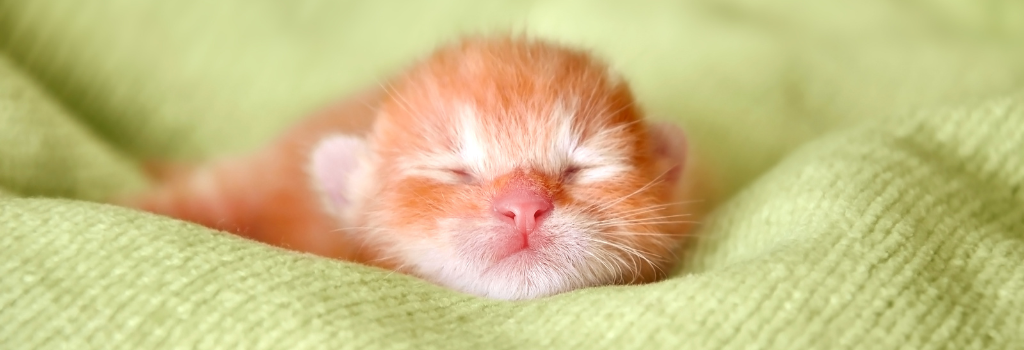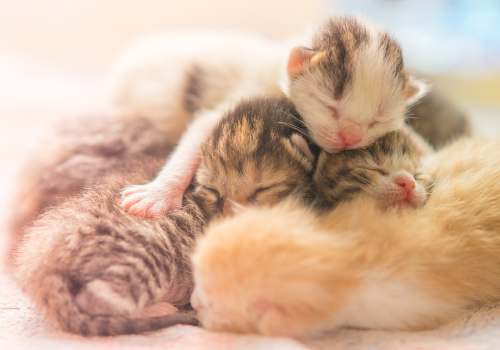As a first-time kitten owner, you probably have many questions about caring for your new feline friend and have turned to the internet to search for answers. Here at Crescenta Cañada Pet Hospital, we want cat owners to have access to the factual, medically accurate information they need to help their kittens live long, healthy, and happy lives. That's why we created this resource filled with answers to some of the most common questions about kitten care. We're so glad you found us and hope you can find the answers you need below!
If you've recently adopted a kitten and are searching for a veterinarian in La Crescenta, CA, we'd love you to entrust us with the care. Give us a call today at (818) 248-3963 to start your new feline friend off on the right paw in life!
What is the most important thing to know about raising a healthy kitten?
Baby kittens should stay with their mothers until they are at least seven or eight weeks old. When it's time for your new kitty to come home, starting them off on the right paw in life with parasite control and kitten vaccinations is crucial. They may also need to be tested for certain diseases if they came from an outdoor situation or arrived at your home as a stray.
We recommend scheduling a veterinarian visit as soon as possible to ensure that your new kitten gets a healthy start. We are here to provide recommendations on food, litter boxes and litter, and preventative care so you can give your new best friend a wonderful life.
What are the right and wrong ways to pick up my kitten?
When picking up your kitten, ensuring they feel comfortable and supported is crucial. We generally recommend scooping them up into your arms from underneath. Hold them close to your body, and don't let their paws dangle. Picking a kitten up by the scruff without supporting their body isn't recommended. Keep in mind, though, that every cat has their own personality. Experiment with different techniques to determine the most comfortable for your feline friend.

How can I tell if my kitten is happy and healthy?
Happy, healthy kittens have two favorite activities: Playing and sleeping. They have fun, energetic personalities, and their curiosity is quite entertaining. A healthy kitten will play and play until they are worn out and in need of a nap.
A few signs that indicate something might be wrong include:
- Decreased appetite or activity levels
- Inconsistent litter box habits
- Hiding/avoiding your family
How should I feed my kitten?
We recommend feeding kittens both dry and wet food. Cats are obligate carnivores, and wet food more closely resembles their natural diet. It also contains more water, which is vital since many cats don't drink as much as they should.
When your kitten is small, providing round-the-clock access to food is acceptable. However, as they grow, you should provide measured meals to regulate their food intake and prevent obesity. As your cat's veterinarian, we can help you better understand how much to feed a kitten and how often. Make sure fresh, clean water is available at all times.
What are some products I might need for my kitten?
We recommend doing some shopping before bringing your new kitten home.
You'll need the following supplies:
- Dry and canned kitten food
- Dishes for food and water
- Kitty litter
- Litter box with low sides
- Kitten toys
- A soft, comfy bed
- Horizontal and vertical scratching posts
How soon should I bring my new kitten to see a veterinarian?
The sooner, the better! We recommend scheduling a checkup within a few days of bringing your new pet home so we can get them started on their kitten vaccinations and set them up on a preventative plan. Your new friend may also need to be dewormed and tested for feline leukemia and AIDS. We will also get them started on safe and effective parasite preventatives to protect them from fleas and ticks.
How can I get the most out of my first veterinarian visit with my new kittens?
Write down any questions you have before your kitten's first appointment. Make a note of any concerns you have regarding their behavior, too. During your cat's first veterinarian visit, our goal is to help you better understand your furry friend's needs so you can give them the best life possible. No question is ever too silly, and we will provide the helpful information you need.
Be prepared to discuss several topics, including vaccinations, parasite prevention, and spaying and neutering. We'll also review your cat's anticipated lifestyle, such as whether they'll go outside or remain indoors. We encourage you to answer questions honestly and thoroughly. The more information you provide, the better we can help you care for your new kitten.
What will a veterinarian look for during my initial kitten care visit?
During your initial kitten care visit, we'll look for several things. We will perform a full physical exam to assess your kitten's overall condition. Certain health problems are common in kittens, so we will look for signs of those issues.
During your kitten's first visit, we will:
- Check their eyes, ears, and nose
- Look for signs of respiratory viruses
- Listen to their heart and lungs
- Examine their teeth and gums
- Make sure the roof of their mouth has properly formed
- Check for hernias
- Palpate the abdomen to feel the organs
We may also ask you to bring in a fecal sample so we can check for intestinal parasites. We'll look your kitty over for fleas and ticks, too.
What are some early signs and symptoms of health issues in your kitten?
Sneezing, watery eyes, and stuffy noses are common signs of upper respiratory infections, which are common in kittens.
Other signs of health issues in kittens include:
- Decreased appetite
- Decreased energy levels
- Diarrhea
- Not using the litter box
- Fever
- Dehydration
Because kittens are so tiny, it's vital to contact us immediately when something is out of the ordinary. Even when the symptoms are mild, it's always worth giving us a call at (818) 248-3963 to schedule an appointment.
Why is it important to avoid self-diagnosing possible kitten health problems?
Again, due to their small size, minor health issues can quickly become critical. Plus, cats are good at hiding signs of illness, so your kitten may be sicker than they seem. Without proper veterinary care, sick kittens often fade quickly, so it's vital to get help at the first sign of trouble.
Keep in mind that while the internet is an excellent source of information, not everything you find online is factually accurate. Spending a few minutes researching symptoms online is not a substitute for having your kitten diagnosed by a licensed veterinarian with years of education and experience. One symptom can have ten different causes, and only a veterinarian can get to the root of the problem and begin the appropriate course of treatment.

When should my kitten get vaccinations?
We typically start kittens on a vaccine schedule at around eight weeks of age. Your kitten will need to return at 12 and 16 weeks and at one year to complete their vaccinations. After that, you will need to bring them in annually for boosters.
All kittens need core vaccines, including FVRCP, feline leukemia (FeLV), and rabies. We may also recommend certain non-core vaccines depending on lifestyle factors, like whether your feline friend goes outside or spends time around other animals.
What do I need to know about kitten behavior?
Like people, kittens are individuals and have their own personalities. Kittens are pretty rambunctious and often rowdy at night when their owners are trying to sleep. Engage them in play shortly before bedtime to tire them out and alleviate this issue.
Nipping and swatting are normal kitten behaviors, but they should be discouraged. Redirect them to appropriate toys when these behaviors occur.
If you still have questions about how to care for a kitten, we'd love to help. As your cat's veterinarian, we're here to address any questions or concerns you may have. If you are located in La Crescenta, CA, or the surrounding areas, call (818) 248-3963 or send an email to [email protected] today!
